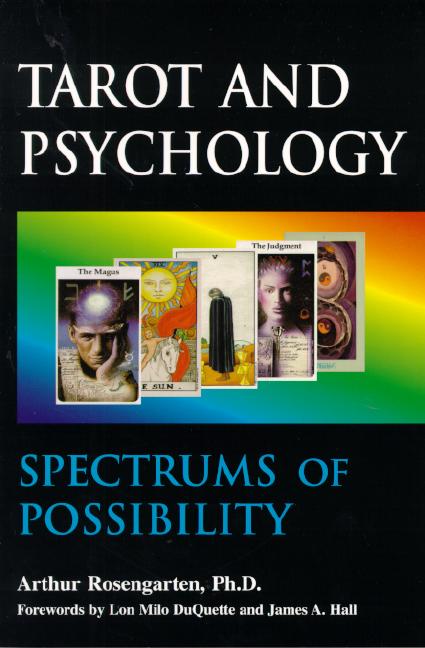Tarot and Psychology (Amazon Kindle) (BN Nook Book)
Based on solid training and research
“This is a book that challenges the thinking of
both practicing clinical psychologist and practicing Tarot readers...this
work is based on solid clinical training and the author’s own extensive
research and practical clinical experience. The author has developed a
Spectrum of Possibility for each card in the Tarot deck. These spectra
are not the cut and dried “card meanings”...but rich shades of psychological
meaning...the author explains the Jungian Theory of Synchronicity, that
is, the notion of acausality. This is the most lucid and uncomplicated
exposition of this important and oft misunderstood subject. This is a “must
read” for clinicians who are looking for new approaches to old problems
and for Tarotists looking for a work with more depth and meaning than yet
another description of the archetypal images of the Major Arcana.”–Linda
Gail Walters, Student of Tarot, San Diego, CA
Wonderful support for the power of Tarot
“This book is a wonderful support document for
the power of Tarot as a counseling tool. Mr. Rosengarten writes in a very
clear and casual style which makes complex concepts understand-able to
the lay person. This book is a valuable companion to the core books....
Somewhat technical at times, the author’s “every-day” references and context
clarify within the body of the work, making frequent trips to a dictionary
unnecessary. There were a few sections that were theoretically over my
head, but their content was not necessary to follow these document to it’s
logical conclusion. Bravo!”–Errol McLendon, Taroist, Chicago,
IL
Does not diminish art or science
“Rosengarten’s remarkable work spans the abyss
that yawns between psychology and mysticism, and does so without diminishment
to art or science.”–Lon Milo DuQuette, Author of Tarot
Of Ceremonial Magick
“Were I still in practice, I would test for myself the integration of Tarot (and other mantic methods) into analysis, something this book has given me courage to attempt.”–James A. Hall, MD, Author of Jungian Dream Interpretation
What??? A Clinical Psychologist Espousing Tarot Cards? Dr. Arthur Rosengarten, in Tarot and Psychology: Spectrums of Possibility, does just that. He explains Tarot to those who may want to learn to use it properly for the greatest good–individuals who desire greater spirituality in their lives, including the benefits of psychological insight and depth, without the baggage of affiliation that invariably accompanies any single set of beliefs. Tarot, they will soon find, operates on many levels of profound meaning from a purely non-affiliated platform in the truest sense. Tarot makes accessible to awareness a full spectrum of psychological and spiritual possibility with little preference for its user’s qualifications or beliefs. Rather magically, one might say, Tarot captures the heartbeat of experience. This fact alone should make the deck of human possibility immediately relevant to helping professionals who deal with the heartbeats of experience daily.
The use of Tarot as an oracle for creating awareness and gaining insight into particular symptoms, problems or questions–i.e. Tarot divination–is often mentioned as an afterthought, alongside other meditational exercises and alternative spread configurations. Yet today, the vast majority of individuals who have discovered the wonders and mysteries of Tarot have done so through experiences of divination. Card reading, without a doubt, is Tarot’s most beguiling and potentially beneficial enterprise. Why dance around the magic?
For Tarot to continue to evolve into the 21st century (and beyond) it must have a stronger application emphasis, that is, it must be relevant, accessible, and meaningful to the changing contours of people’s lives. It must resonate with all who seek greater meaning, creativity, and awareness, not simply with small segments of the waning New Age.
Tarot and Psychology provides an innovative new approach
for understanding the psychological and spiritual possibilities of human
experience.
Listen to an interview with Dr. Rosengarten here:
TABLE OF CONTENTS
List of Charts and Illustrations
Acknowledgments
Foreword by Lon Milo DuQuette
Foreward by James A. Hall
Introduction
PART ONE The Tarot of Psychology
Chapter I The Deck of Possibility
Chapter II Healing Contexts: Three
Vignettes
Chapter III The Tarot Method
Chapter IV Tarot And Systems of Psychotherapy
PART TWO The Psychology of Tarot
Chapter V Symbolic Dimensions
Chapter VI The Laws of Opposition
Chapter VII Universality
Chapter VIII The Fool’s Journey
PART THREE Empirical Studies
Chapter IX Synchronicity
Chapter X The Tarot
Research Project
Chapter XI Case Study: The
Hermit Reversed
Chapter XII Case Study: The Lady
of the Knight
Chapter XIII Conclusions: When Psychology
Meets Tarot
Appendix A Tarot Card Phrases
Appendix B Tarot Dialogues
Bibliography
Index
DR. ARTHUR ROSENGARTEN is a licensed clinical psychologist, Diplomate of the American Psychotherapy Association, and a professional Tarot reader and teacher with twenty-five years of experience in both disciplines. He wrote the first accredited doctoral dissertation on Tarot divination (1985) entitled: Accessing The Unconscious: A Comparative Study of Dreams, TAT, and Tarot at the California Institute Of Integral Studies in San Francisco. He was a featured presenter at the First and Second World Tarot Congress in Chicago and was the Winner of The Consciousness Poetry Slam at Tucson III, Towards A Science Of Consciousness Conference (1997). Dr. Rosengarten is currently in private practice in Encinitas, California, teaches the Tarot Circle now in its 6th year, and leads Continuing Education Workshops on Symbols and Synchronicity For Psychologists and other helping professionals (Approved by The California Board of Psychology) throughout California.






